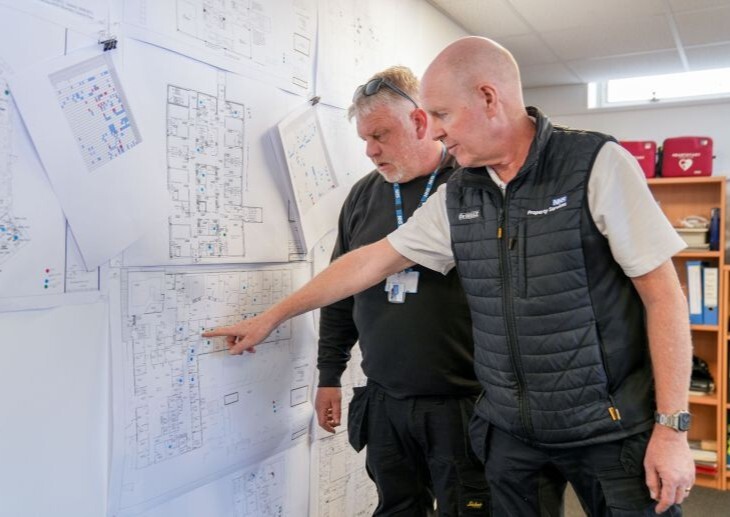Collaboration in Derbyshire is yielding results by supporting complex patients at home and healthcare leaders urge ICBs to get resources to frontline clinicians to enable them to find solutions that work. Kathy Oxtoby reports
Team Up Derbyshire is Joined Up Care Derbyshire’s flagship service that aims to create one team across health and social care to support people with high complexity needs in their homes to prevent them from going to hospital. For those who do need to go to hospital, the service provides help and support to enable them to return home as soon as possible.
This team is not a new or ‘add on’ service – it is a teaming up of existing services – with general practice, community, mental healthcare, adult social care and the voluntary and community sector all working together.
The origins of the service date back to 2019, when Dr Ian Lawrence, clinical director for integration for Derbyshire Community Health Services NHS Foundation Trust, and clinical lead for Team Up Derbyshire, was asked by the then clinical commissioning group (CCG) to look at ways to reduce non elective admissions to hospital.
He says the idea that ensuring an individual at home needing planned or urgent care should be about a team, rather than an individual response, led to looking at ‘how we could create more integrated working between GPs, community, and social care’.
‘One of the challenges is that when you start talking about integrated working, people say it’s a great idea, but generally organisations think others should integrate with them,’ says Dr Lawrence. ‘We thought about how people could come to the table and work as partners,’ he says.
PCNs were commissioned to set up home visiting services, which would involve different health and care professionals from different sectors collaborating and building close links.
Creating a culture of integrated working is ‘about focusing on the human elements of change’, he says. It is less about structures and how organisations are led and more about ‘giving people the freedom and support to do things they know are right’.
Organisations involved in Team Up Derbyshire are given the flexibility to create solutions at a local level. And because colleagues from different sectors now know each other, they are able to work through problems together, he says.
Team Up Derbyshire is about ‘teaming up multidisciplinary, multi-agency teams who provide the wrap around care of a person’, says Dr Penelope Blackwell, a GP at Hannage Brook Medical Centre, Wirksworth in Derbyshire, and chair and clinical director for Neighbourhood Care, NHS Derby and Derbyshire ICB.
This team approach means care and response to problems is more holistic and closer to home and that team members look not only at patients’ clinical conditions, but also other aspects of their health and care, for example mobility issues, money issues, housing, loneliness or whether they need bereavement support, for example she says.
The approach also reduces attendances to statutory services later on, and empowers people to manage their own health and wellbeing, says Dr Blackwell.
NHS Derby and Derbyshire ICB has provided the resources to support the Team Up Derbyshire service, such as Team Up GPs – community GPs employed by PCNs, who oversee the care of housebound patients in a neighbourhood, working with, and supporting the broader team of paramedics, district nurses and other members of the multidisciplinary team.
The service also ‘couldn’t have worked without the support of Derbyshire Community Health Services NHS Foundation Trust (DCHS)’, says Dr Lawrence. ‘It’s been incredibly supportive and flexible’.
Jim Austin is chief executive of DCHS. The Trust’s staff support people with hospital avoidance, discharge, rehabilitation and maintaining independence, and provide some of the Team Up Derbyshire services. He is also senior responsible officer for the ICB’s community transformation programme.
‘We think that 6,000-7,000 older people in Derby and Derbyshire could be helped at home rather than going into hospital, which means around 1,600 fewer older people being admitted to hospital a year,’ he says. Being able to look after those people at home would ease pressure on hospitals, making them safer and more efficient, he says.
‘Team Up Derbyshire is a thing of many parts’, and the Trust provides input, including urgent community response, and therapies, says Mr Austin.
He says the Trust has a close relationship with NHS Derby and Derbyshire ICB and is working with the ICB to look at how it can help the organisation fulfil its integrated neighbourhood teamwork, which includes many of the Team Up Derbyshire initiatives. The Trust is also looking at ‘how we can help the Team Up teams to demonstrate the value of the work they are doing’, he says.
‘Ultimately, if we can demonstrate that, it will shift money and resources away from that most expensive part of the system – the acute hospital – into the community. And the more you can do in the community the less you have to do in the acute setting,’ he says.
Already, Team Up Derbyshire has been easing pressure on acute hospitals. Over Christmas, two integrated Team Up Derbyshire teams were able to recruit temporary staff, funded by the ICB to increase their capacity to reduce pressure in secondary care, says Dr Lawrence.
The value of Team Up Derbyshire is also demonstrated in figures for the 12 months from January to December 2024 which suggest nearly 600 fewer attendances than would have been expected at A&E, of people who are the most frail, and over 350 fewer unplanned (emergency) admissions to hospital of this group.
People living in the community ‘are getting a better service’, says Dr Lawrence. And health and care teams are benefitting too, with 93% of people working in Team Up Derbyshire services recommending it as a place to work.
GPs are saying the approach is ‘making their lives better because they are able to attend to the work they want to attend to more easily’, says Mr Austin.
Dr Blackwell says this holistic approach is reducing the chances of people needing repeated visits from their GP.
Networking, collaboration, and a culture change have been involved in making Team Up Derbyshire work.
‘Team Up Derbyshire is the first truly integrated team we’ve created, and we couldn’t have done that without networks’ commitment and the collaboration of organisations who “get it” – it’s all about the culture shift,’ says Dr Blackwell.
Changing the culture involves personalisation, distributed leadership, communities driving change, taking risks (of doing things differently), being asset-focussed, and strength-based – what’s strong, rather than what’s wrong, she says.
‘Creating some more formal shared infrastructure’ is a next step for Team Up Derbyshire, says Dr Lawrence.
Mr Austin’s hope is for ‘continued growth and integration between acute specialist activity, but being able to undertake that in people’s homes or as close to home as possible’.
Supporting general practice and community teams with an acute outreach for patients with long term conditions, would also be an area of growth, he says.
And he says there is ‘work to be done for everyone to understand clearly how to access these Team Up Derbyshire services’.
To ICB and ICS leaders he says: ‘Focus on the outcomes you want to get to, and let the resources and the ways of doing things get as close to the frontline as possible.’
Dr Blackwell says to ‘allow the culture change to happen and flourish’. ‘It takes time, don’t be impatient, but do truly commit to it. Be brave and courageous.’
‘And give people the tools to find their own solutions, rather than trying to find them on their behalf,’ says Dr Lawrence. ‘Support people to find their own way.’






